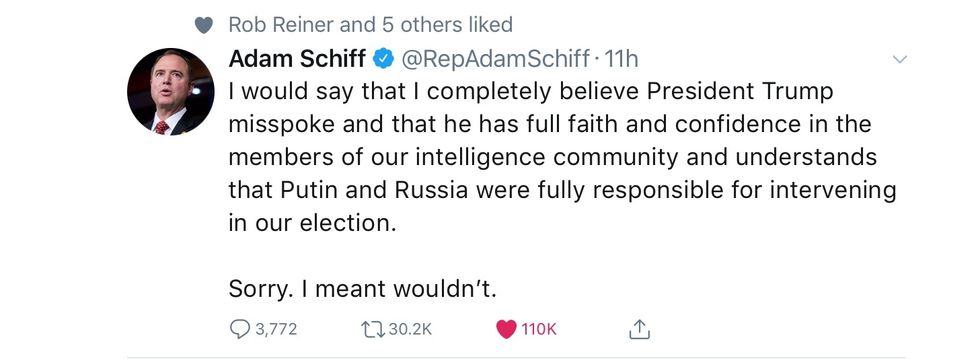WASHINGTON — It was really just a mix-up, he insisted. Like confusing "affect" and "effect," but for unprecedented global cyberaggression.
"I thought I made myself very clear," President Trump said, alternately riffing and note-reading on Tuesday from his chair in the White House Cabinet Room. "I came back, and I said, 'What is going on? What's the big deal?'"
Well.
Mr. Trump had just returned from Finland, where he sided against his own intelligence agencies' conclusions about Russian interference in the 2016 election during a meeting with President Vladimir V. Putin of Russia. "I have President Putin; he just said it's not Russia," Mr. Trump had said on Monday. "I don't see any reason why it would be."
And by that, Mr. Trump said on Tuesday, more than 24 hours later, he meant the exact opposite. "The sentence should have been, 'I don't see any reason why it wouldn't be Russia,'" Mr. Trump said. "Sort of a double negative."
He looked up at the cameras, then back down. "So," he concluded, "you can put that in. And I think that probably clarifies things pretty good by itself."
It did not. And in an instant, Mr. Trump had joined the pantheon of dubious executive word-parsing and malapropisms, a bipartisan enterprise with decades of entries, if little precise precedent for Tuesday's excuse-making.
President Bill Clinton once wondered "what the meaning of the word 'is' is," as he strained to weather the Monica Lewinsky affair.
President George W. Bush once observed that the United States' enemies "never stop thinking about new ways to harm our country and our people — and neither do we."
For Mr. Trump, typically loath to correct himself, a thorough revisionism seemed to register as the only option on Tuesday. But, as ever, clarity was elusive. At various points, he both suggested that what he had said beside Mr. Putin "should have been obvious, I thought it would be obvious" and again raised doubts about what he truly believed.
"Could be other people, also," he said, after appearing to embrace the intelligence agencies' consensus that Russia interfered in the 2016 election. "There's a lot of people out there."
By the end, many in Washington seemed skeptical that there had been much of a reversal, imagining how other moments in history might have been undermined by linguistic excess with negative words.
Speak softly and don't not carry a big stick.
Ask not what your country cannot not do for you.
"'Mr. Gorbachev,'" Matt Viser, a journalist at The Boston Globe, joked on Twitter, "'don't not tear down this wall.'"
New York Times, July 17, 2018
Better yet, watch the phony press conference by #TraitorTrump. CBS
###
July 18, 2018
Post Script.Summary of Trump's recanting- After Trump embarrassed America by dissing our Agencies & groveling before Putin, he pretended a one word mistake & claimed to blame Russia but added, "Could be other people, also." Just a Traitor & liar. #StopTrump #TraitorTrump #Midterms2018
Some reactions on Twitter to #TraitoTrump's “misspoke" fiasco.




